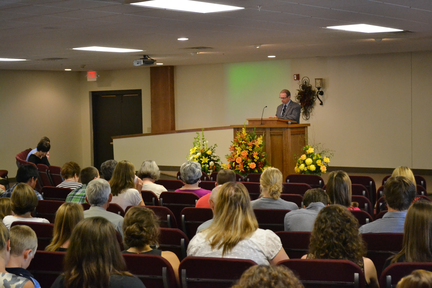11-07-2019 Mourning Hedonism Revelation 18:9-20

I. A Kingly Cry (vv.9-10)
II. A Commercial Cry (vv.11-16)
III. An industrial Cry (vv.17-19)
1. Do I view myself as an owner or a steward?
2. Do I give God my very best?
So What?
1. God considers not only what people do but also who or what they condone, benefit from, and cooperate with.
2. Will we be part of a funeral or worship service?
3. Human beings should never be reduced to commodities.
Through the negative example of Babylon, this passage admonishes us about our use of material possessions.
1. God considers not only what people do but also who or what they condone, benefit from, and cooperate with. The kings, merchants, and mariners suffer because they have cooperated with Babylon in her sinfulness. There are sins of commission as well as sins of omission. This passage reminds us to think not only about our actions but about the networks, alliances, and partnerships we indirectly support and endorse. We obviously know not to take up residence in Babylon, but do we give enough thought to our cooperation with her when we are the ones profiting? This issue quickly becomes complex in the modern world, but complexity doesn’t excuse total avoidance of the issue. Better to be faithful in small ways than to restrict our discipleship to only religious arenas. To apply this passage, one might decide to take a few minutes to explain the issue of fair trade and help Christians understand that economic decisions have far-reaching consequences. Or, more generally, one might give time to helping people see how easy it can be to put our hope in earthly treasures, especially when such pursuits are endorsed by both our culture and our churches.
2. Do you prefer funerals or worship services? Resseguie is probably correct in saying that this funeral lament of the kings, merchants, and mariners of Revelation 18 is a parody of the heavenly worship service of Revelation 4–5 with the four living creatures, the elders, and all of creation—what he labels a “counterworship service for the counterfeit god.”5 We choose whom we will serve; then our God/god determines the outcome: eternal life in the new heaven and new earth, or a funeral where you mourn the sudden death of your god. We shouldn’t trust in earthly treasures because they cannot support us. They are false gods that will eventually collapse under the weight of faith. We also should not invest in earthly treasures because that keeps us from investing in heavenly treasures. This text offers a fitting occasion to discuss the role of material possessions in the life of a believer and a community (cf. 1 Tim. 6:6–10, 17–19). For instance, how many of the treasures listed in 18:12–13 (or their modern parallels) do we ourselves own?
3. Human beings should never be reduced to commodities. The last item listed in 18:13 reveals the depths of Babylon’s depravity. Human beings are treated as trade goods. But gold, silk, and citron wood weren’t created in God’s image; only human beings have been stamped with God’s likeness. Trafficking in human slaves provides the most blatant modern equivalent. Yet do we also condone more subtle practices that commodify human beings? The “adult entertainment” business (and those who use pornography) reduces human beings to sex objects. What about the sports industry, which cares for players solely for their performance value? Even our desire to pay the lowest price can create the market for industries that use people as machines in the production of their goods. God’s judgment of Babylon is harsh in part because of the enormous value and worth he has bestowed on human beings.
▪ God is able to bring judgment upon worldly power centers suddenly and decisively.
▪ Those who participate with evil, including putting their hope and trust in worldly treasures, will not only be deeply disappointed but will suffer great personal loss.
▪ In the end, sin brings destruction and hardship.